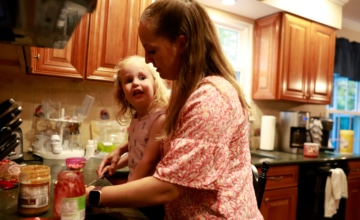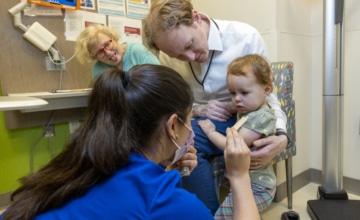Terry A. Adirim, Office of the Assistant Secretary of Defense for Health Affairs, Falls Church, Virginia
Ann Thomas (A.T.) Johnston, Office of the Assistant Secretary of Defense for Military Community and Family Policy, Washington, DC

Abstract
Despite the differences between civilian and military life, the family unit remains a unifying force in the community. This article describes how the Department of Defense recognized that putting support—beyond clinical medical care—within a medical setting could be a valuable resource for families. The authors share the promising results that are emerging from a pilot effort of implementing HealthySteps within the military community.
It is common to see headlines in the media discussing the civil–military divide. A frequent theme is that the American public is out of touch with its armed forces. In a time of low unemployment, finding qualified candidates to raise their hand in defense of their country can be challenging, and the divide widens even further. While it is easy to identify the distinctions that exist between those who serve in uniform and those who do not, less often is the focus on what unifies these groups. We see a fundamental similarity between the military and civilians. At the core of every community—be it inside or outside the gates of a military installation—lies an essential commonality: the family unit. This article will discuss not only what unifies our communities, it will also detail the Department of Defense’s commitment to building and supporting strong communities by investing in families.
For those with no connection to the military, the family image of military life that may first come to mind is that of the airport reunion. For example, a television commercial or online video may highlight emotional homecomings after a deployment—a service member in uniform reuniting with his or her family, scooping up small children, hugging spouses, and being present in a moment of sheer gratitude and love. To be sure, these moments happen every day around the world. But they are points in time on a trajectory that includes more routine moments of family life. Grocery shopping, finding suitable child care, balancing work and life, seeing their son or daughter perform in an after school activity—all while still finding time to connect as a family; these are all familiar daily challenges for families across the country.
The Department of Defense recognizes the need to provide resources for families to successfully navigate the routine stressors of family life, as well as those unique stressors that come with military service, such as separations and frequent moves. For years, the department has provided resources from the moment a family is formed through their transition from military service to civilian life. These dedicated resources include the New Parent Support Program, which provides everything from information and support to home visits for expectant parents and new parents following the birth of a child. The military also provides families with child and youth programs, including child care, after-school programming, and recreational resources.

At the core of every community—be it inside or outside the gates of a military installation—lies an essential commonality: the family unit. Photo: Kiwi Street Studios
To support families during times of relocation, the department has worked tirelessly with states through the Interstate Compact on Educational Opportunity for Military Children, which allows for a smoother transition of a student’s records between school systems and enhances the ability to keep the student’s activities, like involvement in sports, on track. However, just because the department developed resources and programming does not necessarily mean all families have an awareness of them or access to them when needed.
There is a familiar saying: the definition of insanity is doing the same thing over and over again and expecting different results. As leaders and practitioners who have worked within institutions our entire careers, this common saying can often prove prophetic. Within the military community, we strive to connect service members and families with the resources that will enhance their well-being and support their mission readiness. Years of practice have led us to rely on well-traversed paths of information dissemination, including, but not limited to, those below.
- Put out the information at formation. (a formation is a gathering of service members, typically on a daily basis, where commanders and leaders relay pertinent information about work/duty, installation activities, and other news)
- Hang a flyer at the commissary. (a commissary is a grocery story on a military installation)
- Hold a coffee event at the family center.
But what happens when a new dad or mom misses formation that day? Or doesn’t shop at the commissary? Or is juggling too many items on a to-do list to make it to the family center? To effectively support parents in the military, we need to tap into the best practices within the civilian world. We must connect parents to the resources they need, at the places they are already going. We know that for new parents, whether one or both are working, whether one or both are deployed or otherwise geographically separated, just getting to the grocery store can be a feat. Attending their own doctor’s appointments may be a line item that constantly moves down the never-ending to-do list. One appointment we know that parents aren’t missing, however, is their child’s “well-baby” visit.
The Department of Defense recognized that putting resources, connections, and support—beyond clinical medical care—within a medical setting could be a true value-add and force-multiplier for families. As a result of a desire to break out of well-traversed paths that may not reach the entire community, the department began a pilot effort of implementing HealthySteps within the pediatric clinics of two hospitals, with more on the way. HealthySteps, a program of ZERO TO THREE, is a model of pediatric care that embeds a child development professional within pediatric clinics to provide warm connections to resources outside of the typical 15–20 minutes that parents may have with their child’s pediatrician. We believe every parent can relate to this concept. For those who recall being first-time parents, lists of questions to ask the doctor may still exist in a kitchen drawer or smartphone app. Yet, for the items that go beyond pediatric medical care, parents may be left to rely on family to help with answers.
For military parents whose extended families may be thousands of miles away, the inability to seek help, comfort, and connection (in person/face-to-face) from a family member is not only a challenge, but likely a real stressor. Having access to another helping professional for those nonmedical questions can make a big difference. The HealthySteps specialist can be that reliable, consistent presence at well-baby visits, to answer questions, such as “how do I deal with budgeting for the cost of a new baby?” or “how do I figure out how to talk to my spouse like a partner again and not just as a co-parent?” Within the military community, the HealthySteps specialist is a licensed mental health provider and not someone focused on clinical care. Rather, the HealthySteps specialist focuses on preventing the escalation of symptoms or situations to the point at which, left unchecked, they require a higher level of clinical care, create discord in the family, or diminish military readiness. HealthySteps is a prevention program that supports the whole family—embracing the belief that one cannot take care of a child without taking care of the parent.
The department recently completed the first year of its HealthySteps pilot. From the hundreds of families who have taken part in the pilot program, several themes have emerged.
- New parents need all the support they can get (and more).
- Serving in the military adds unique challenges for new parents (frequent moves and relocations, deployments, and spouse unemployment, to name a few).
- HealthySteps helps to mitigate these challenges.

The HealthySteps specialist can be that reliable, consistent presence at well-baby visits, to answer questions, such as “how do I deal with budgeting for the cost of a new baby?” Photo: Kiwi Street Studios
For the young soldier who is also a single parent, negotiating the balancing act of parenthood and service can be a challenging one. HealthySteps has been found to help ease the “nervousness” around that balance. For a new mom who has to go to the field for 2 months during her baby’s first year, the span of time when she reunites with the child is a critical one. New parents see the HealthySteps specialist as a trusted professional who can help with strategies to deal with the fear and anxiety of being apart and provide guidance on how best to re-connect. For military families separated by deployments, HealthySteps helps parents identify the avenues that exist to maintain connections—especially with young children.
While HealthySteps may still be in its infancy, so to speak, within the Department of Defense, one early and important lesson learned is that by embedding nonmedical resources in medical settings and adapting the evidence-based HealthySteps model, life is easier, and less stressful, for the family. And that is something all families can use.
Authors' Note
The views expressed are those of the authors and do not reflect the official policy or position of the Department of Defense or the U.S. Government.
Learn More
Military Projects at ZERO TO THREE
Interstate Compact on Educational Opportunity for Military Children
Authors
Terry A. Adirim, MD, MPH, FAAP, is deputy assistant secretary of defense for health services policy and oversight in the Office of the Assistant Secretary of Defense for Health Affairs. In this role, she serves as the principal staff assistant and advisor to the assistant secretary of defense for health affairs (ASD HA) for clinical policies and programs, including oversight of quality assessment/quality improvement, patient safety, mental health services, and population-based health care management across the Military Health System. Prior to assuming her current role, Dr. Adirim was the acting principal deputy assistant secretary of defense for health affairs as part of the ASD HA. Dr. Adirim’s federal experience includes senior level positions at the U.S. Department of Homeland Security and in an executive position at the U.S. Department of Health and Human Services.
Ann Thomas (A.T.) Johnston, is deputy assistant secretary of defense for military community and family policy. Mrs. Johnston is responsible for a broad portfolio that includes policy, advocacy, and oversight of all community support to service members and their families, including quality of life issues; Defense-state liaison initiatives; family, child, and youth programs; Military OneSource program and nonmedical counseling resources; military spouse career advancement; morale, welfare, and recreation; defense resale policy for commissaries and exchanges; and family advocacy programs. Her oversight also includes casualty and mortuary affairs, and military funeral honors.
Suggested Citation
Adirim, T. A., & Johnston, A. T. (2019). PERSPECTIVES—Supporting strong communities with the HealthySteps program. ZERO TO THREE Journal, 40(1), 53–43.




